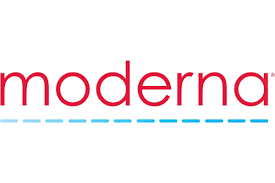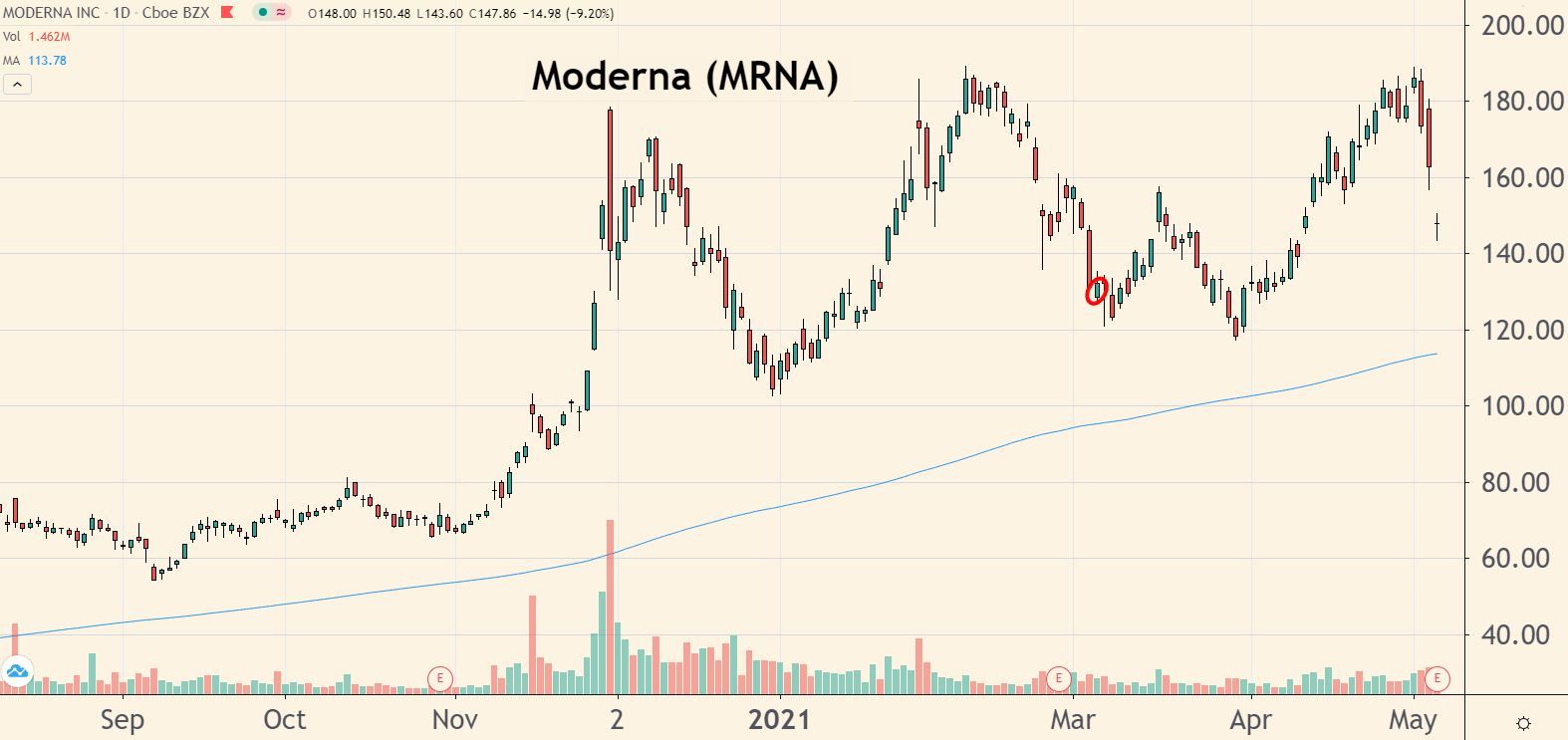My Moderna Prediction: Biden's Patent Waiver Won't Slow Profits

In the stock market, the hard part is knowing when to keep your eyes on the floor show, instead of the "smoke" from the dry ice that's partly obscuring your view of the stage.
That's what came to mind when I read yesterday that the Biden administration is going to add its support to calls for Moderna (MRNA), Biontech (BNTX), Pfizer (PFE) and Johnson & Johnson (JNJ) to waive patent protections on their COVID-19 vaccines.

The news prompted a knee-jerk selloff in those stocks. Moderna's shares finished Wednesday's session with a 6% loss.
Watch my video here, or keep reading below...
This morning, the company also reported its first quarterly profit - generating sales of $1.7 billion, with earnings of $2.84 a share - far above the $2.39 a share that analysts expected.
And the stock is down another 9%.

Alas, a sharp headline-prompted drop in a stock is always painful to experience if you own the shares like I do.
But I suspect that waiving the vaccine patents of these companies is not going to hurt their profit estimates, nor (unfortunately) increase the supply of global COVID-19 vaccine all by itself.
Here's why...
Back in October, Moderna came out firmly in support of efforts to relax patent restrictions on its vaccine so it could be manufactured and distributed more quickly in other parts of the world.
As the Fierce Pharma blog noted at the time...
Responding to investor questions, the company now says it won't enforce its vaccine patents against other companies during the pandemic.
In a Wall Street Journal interview, company President Stephen Hoge said Moderna is “quite studiously not asserting infringement.” Without naming names, the biotech says other COVID-19 vaccines in development might be using Moderna-patented technology.
I'm sure there's a legal difference between the decision to not enforce a patent, and a patent waiver.
Nonetheless, the effect is the same - to remove legal and financial barriers to manufacturing the vaccine in a time of pandemic emergency.
Yet here we are 6 months later and we're still seeing an ever-rising series of desperate calls from global health organizations that there isn't enough global vaccine supply.
So I doubt that declaring an international waiver on vaccine patents now - on top of Moderna's declaration months ago that it wouldn't enforce those patents - will improve the global vaccine situation.
I came across a fascinating blog article written by Harvard's Petrie-Flom Center for Health Law Policy says it's a lot like possessing a cooking recipe.
The simple fact of knowing the recipe won't turn me into the next Emeril, or my wife (who's a great cook, by the way) into the next Martha Stewart:
One or more patents will provide a recipe for a process or a component needed to produce a vaccine.
But, just as with a culinary recipe, the informational power of a patent does not cover any tips or instructions that have not been memorialized in writing, nor does it provide any access to the raw materials needed to put a vaccine together.
In other words, there's a lot more to making a COVID-19 vaccine than is written down in the patent itself.
That's why Moderna's scientists and pharmaceutical engineers make the big bucks.
It's also likely why very capable pharmaceutical manufacturers in Russia, China and elsewhere - places where there's little respect for foreign intellectual property even in the best of times - have been unable to flood the market with a generic version of the Moderna vaccine, even months after the company said it would not enforce its vaccine patents.
So if waiving the patent nowisn't the solution to more vaccine supply, what is?
It comes down to the challenge of pulling together all the components that go making the vaccine.
An analyst at the Jefferies research firm on Wall Street sent out this note to the firm's clients yesterday:
...in reality, the vaccine bottleneck is more related to having enough vials and raw materials to manufacture the drug rather than being a paten issue, the analyst tells investors in a research note.
So getting back to the real issue for Moderna shareholders...what will the possibility of a global patent waiver mean for the company's earnings in coming quarters?
I don't think it will amount to much, nor will it hurt the stock in the long run.
For one, the company is already on track to earn...
2021: $23 a share
2022: $16.94 a share
If we divide Moderna's current stock price of $162 by its 2021 profits, we get a price/earnings ratio of 7.
In my opinion, that's just far far too low for a company that's going to be reporting a gusher of profits for the next 8 quarters, and likely beyond (presuming we all need annual COVID booster shots in the years to come).
Let's also keep in mind that Moderna's profits are being generated from sales orders that were booked in prior quarters from the US government, the European Union, Japan and other developed countries.
Sales orders from less-developed countries - where vaccine availability is still a major problem, and presumably the main benefactors of a patent waiver - haven't been a major factor in Moderna's profit picture.
So here's my 2-cents prediction on Moderna's stock price...
Yesterday's selloff happened within just a few days of the stock hitting a (marginal) new alltime high. I think the "patent waiver" news was simply an excuse by traders to take profits with the stock at a critical resistance level.
I believe the stock will likely move sideways - within a range from the $150s to $185 - through this summer.
But as we head into the second half of the year, Moderna will be primed to book some seriously large quarterly profits - analysts expect the company to report a profit of $6.85 a share for Q3 and $7.15 a share for Q4.
So as those reporting periods come into view, I think that will be the cue for institutional traders - likely loading up on the stock at current levels - to push the stock to new alltime highs at $200 and beyond.
Best of Good Buys,
Jeff
Member discussion